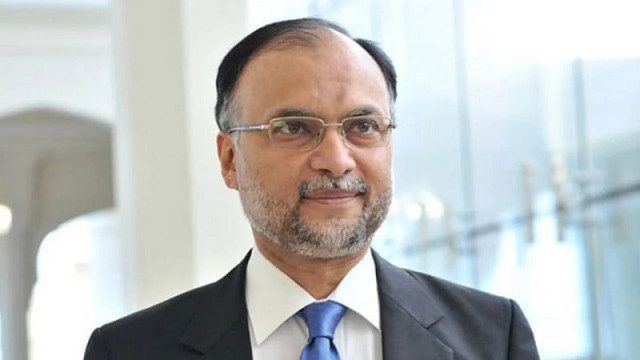Islamabad:
The Minister of Planning Ahsan Iqbal proposed urgently revising the price of the National Finance Commission and suggested freezing the population number at 241.5 million and including indicators such as water and climatic vulnerabilities for money distribution purposes between units units.
Iqbal made the recommendations to Prime Minister Shehbaz Sharif, asking him to review the 15 -year -old sentence that has survived his five -year constitutional life and requires revision to mitigate the “acute stress” of the federal government. The president of Pakistan extends the price each year due to a disagreement between the provinces and the center on the new formula.
The recommendation was made at a time when the 10th National Finance Commission expired on July 21 and the Ministry of Finance, which is the Commission Secretariat, is in the process of forming a new commission.
The Sindh selected Asad Sayeed and Khyber-Pakhtunkhwa could again be represented by Musharraf Rasool Cyan in the 11th Commission. Nasir Khosa can represent Punjab as a technical member, but there is not yet an official notification, which must be issued after the approval of the President of Pakistan. Balutchistan appointed Mr. Farman.
The Minister of Planning and Development has proposed new multiple criteria, for the distribution of resources by focusing on the development -oriented formula instead of a prices for demographic predominance.
The Minister suggested to the Prime Minister that the number of populations should be frozen in the last census (241.5 million) and that its weight should be reduced by the current level to promote the stabilization of the population.
The 82% of the NFC is distributed on the basis of the population among the provinces, which is an incentive to control the population and to exaggerate the number as well.
The annual population growth rate of Pakistan is 2.6%, which is close to the annual economic growth rate and is very unbearable. The current horizontal distribution is strongly weighted (82%) to the population.
Although the population is an essential indicator, this creates unfavorable incentives against the control of the population and penalizes the provinces with better demographic management, said Iqbal.
The Minister of Planning has also recommended to include the performance of provincial income as a new criterion to distribute resources. He wrote that it is necessary to reward the provinces with higher tax / GDP ratios and a stronger digital tax infrastructure.
The provinces have no incentives to extend their narrow tax bases and to rely strongly on their actions under the NFC.
The Minister also proposed, in particular environmental resilience as a new criterion by adding indicators such as forest coverage, climate adaptation investments and reforestation efforts.
According to another important recommendation, the results of human development should be linked to the transfer of resources and the province should prioritize education, health and gender equity.
The Constitution requires that the five governments unanimously agree on the new formula and even if a government does not agree, no change can be made to the sentence.
The Minister also recommended that it include the vulnerability of water as another new criterion and suggested allocating funds to the provinces investing in infrastructure and sustainable management.
The Minister underlined national unity and inclusion as a reference for the distribution of money between the center and the provinces. The center only obtains 42.5% and is also responsible for expenses for Azad Jammu- & Cashmire, Gilgit Baltistan and the ICT of the divisible Pool to ensure full participation in the national development of their citizens.
The Minister said that more than 150 billion rupees are spent each year by the Federal Government for Development and Recurrent Obligations at AJK, Gilgit-Baltistan and merged districts and the territory of the capital of Islamabad all of the federal part, while these regions have the right to have their own share in the divisible pool as other provinces.
The Federal Government also finances the Benazir income support program (BISP) up to 716 billion rupees, although social protection is a decentralized provincial subject after the 18th amendment.
Iqbal said that it was necessary to immediately launch the process for a new reward from the National Finance Commission (NFC), adding, it is both a constitutional obligation and a tax necessity.
Iqbal said that the 7th NFC price has now been in force for almost 15 years – far beyond its duration and deserves consideration following new realities.
He said the federal government was facing budgetary pressures due to the current NFC price anomalies. A new NFC prize is therefore imperative to ensure that tax federalism remains dynamic, fair and reactive to the evolutionary development landscape of Pakistan while protecting the rights of the provinces, he added.
Due to the limited budgetary space and higher debt expenses, the federal government is not found with enough budgetary space for development spending. The Minister said that the Public Sector Development Program (PSDP) is alarmingly reduced – by 2.6% of GDP in 2018 at only 0.8% in 2025.
This regression represents not only a constraint on national development, but a systemic distortion of constitutional budgetary responsibilities with federal sub-financed subjects, he added.
He also emphasized the encouragement of budgetary responsibility and the generation specific to income at the provincial level, and especially the operationalization of provincial finance commissions (PFC)
The constitutional promise of equity cannot be carried out without intra-province of resources. Provincial finance commissions (PFC), which were planned to decentralize resources within the provinces, remain largely dormant or not transparent in their operation, he added.
The new NFC prize should make the operationalization of PFCs compulsory as part of the NFC frame, recommended the Minister of Planning.
Without an adequate federal budgetary space, the implementation of flagship national programs – including special economic zones (ZES), digital Pakistan, the national network, dams, human resources development and the multi -model connectivity infrastructure – remains compromised, said the Minister.




